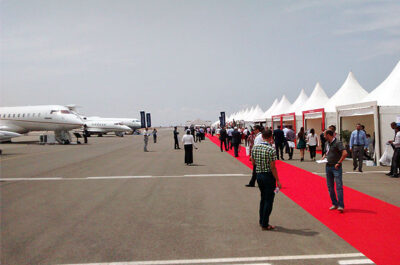
The recruitment and training panel at the MEBAA Conference Jeddah.
Market assessed at MEBAA Conference in Jeddah; National Aviation Academy to support training to meet demand.
The business aviation market in Saudi Arabia was assessed last week at the MEBAA Conference in Jeddah. In particular, the event examined the market since May 2016 – the date of the last MEBAA Conference. Brought together at the Jeddah Hilton by the Middle East and North Africa Business Aviation Association (MEBAA) supported by the General Authority of Civil Aviation (GACA) of Kingdom of Saudi Arabia, the key note presentation was delivered by Captain Abdulaziz Nagadi, Assistant President Aviation Standard in additional to key industry leaders from Saudi Arabia and the Middle East shared valuable knowledge to an audience of over 150 regional business aviation professionals.
The business aviation market was discussed in a panel led by Abdul Rahman Charafeddin, Global Sales Director of UAS International Trip Support; Faisal Alsaddik, Aviation Expert; Josh Stewart, Founder and CEO of XJet and Captain Mohammed Al Gabbas, Vice President of NasJet, examined the effects of new technology on business aviation, including an in-depth discussion around the potential for apps in the industry, among others.
As part of GACA increased commitment to MEBAA Conference Jeddah and to business aviation, another presentation was delivered by Mohammad AlHareeri, Foreign Airline Manager, “It’s very heartening to hear GACA’s support for business and private aviation,” said Stewart. “Despite the business aviation market tightening over the past year or two, the long term fundamentals and future for the industry in the region is still huge.”
“Saudi Arabia is progressively changing and becoming a land of opportunities for its citizens and for business,” said Captain Mohammed Alsubaiei, Director, Saudi Aramco Local Workforce Development, Department Director and National Aviation Academy Project Manager. He continued, “The aviation industry sits at the heart of that change and is one of its driving engines.”
Alsubaiei noted that Saudi Arabia will require 8,800 pilots and 11,700 technicians by 2024 due to attrition replacement and fleet growth, which is expected to grow by 5.5% by 2022 based on current order commitments. In order to meet this demand, he announced that the National Aviation Academy Initiative will “facilitate sustainable growth of the Kingdom’s aviation economy through highly trained and qualified Saudi professionals while enabling a vibrant and growing Saudi and regional aviation sector.” Planned to open fully in 2020, the initiative will count among its strategic objectives to “Contribute to the Kingdom’s economy” and “support aviation growth”.
Other topics discussed throughout the day included business aviation growth, profitability, and competitiveness; and insurance and risk management: understanding business aviation risks.
A new feature on the conference agenda were the final roundtable sessions, covering a variety of topics designed to meet the needs of the conference attendees. The four key focus areas were: risk management; flight support and ground control; maintenance and cost control; and implementing regulations to private owned aircrafts: the grey market.
“Saudi Arabia has always been a leader in business aviation in the region,” said Ali Alnaqbi, Founding & Executive Chairman of MEBAA. “The MEBAA Conference Jeddah is a fantastic opportunity to bring the key industry players together to discuss challenges and opportunities, and to really drive the industry forward together. It was wonderful to see all of the attendees take such an active participation in the event, demonstrating the need for this conference here in the kingdom.”
Tatiana is the news coordinator for TravelDailyNews Media Network (traveldailynews.gr, traveldailynews.com and traveldailynews.asia). Her role includes monitoring the hundreds of news sources of TravelDailyNews Media Network and skimming the most important according to our strategy.
She holds a Bachelor's degree in Communication & Mass Media from Panteion University of Political & Social Studies of Athens and she has been editor and editor-in-chief in various economic magazines and newspapers.



























































































































































































